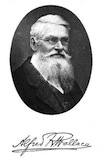 Evolution
Evolution
 Intelligent Design
Intelligent Design
The Thoroughly Modern Alfred Russel Wallace
 At Victor Davis Hanson’s Private Papers, Terry Scambray gives a nice review to our own Professor Michael Flannery’s two recent books, Alfred Russel Wallace’s Theory of Intelligent Evolution: How Wallace’s Theory of Life Challenged Darwinism and Alfred Russel Wallace; A Rediscovered Life. I’m struck by the way in Scambray’s telling, compared to Darwin, his co-discover of the theory evolution by natural selection, Wallace emerges as much the more modern of the two.
At Victor Davis Hanson’s Private Papers, Terry Scambray gives a nice review to our own Professor Michael Flannery’s two recent books, Alfred Russel Wallace’s Theory of Intelligent Evolution: How Wallace’s Theory of Life Challenged Darwinism and Alfred Russel Wallace; A Rediscovered Life. I’m struck by the way in Scambray’s telling, compared to Darwin, his co-discover of the theory evolution by natural selection, Wallace emerges as much the more modern of the two.
Do I dare use the adjective “progressive”? Wallace was certainly that — in his socialism and in his rejection of the typical 19th-century racism that Darwin himself embodied. Beyond that, Wallace went on to reject key points in Darwinian theory in favor of a proto-intelligent design view:
Flannery makes a persuasive case that Wallace’s wide experiences and definitive scientific observations made him an early and convincing advocate of what is now called intelligent design.
[…]
Flannery brings in other sources to further erode one of modern science’s iconic depictions: Darwin as the unflinching observer of nature who is grudgingly forced to detestable, materialistic conclusions.
Wallace, on the contrary, found that a materialist account of evolution could not explain the great discontinuities in nature, like the unbridgeable gap separating dead matter from life and the profound differences between plants and animals and the impassable chasm separating man from the rest of the animal kingdom, including man’s unique pursuit of love, beauty and truth.
In The World of Life, Wallace explained why he thought this about man:
Some of man’s physical characters and many of his mental and moral faculties could not have been produced and developed to their actual perfection by the law of natural selection alone, because they are not of survival value in the struggle for existence. [his italics]Wallace sounds modern in his understanding that “the problem of the origin of life was essentially a problem of the cell” as Flannery puts it. And Wallace had this insight during the late 19th century when the cell was thought to be merely “an accretion of protoplasm”.
Then like now, many individuals also thought that they had resolved the problem of life’s origins by insisting that organisms could self-organize because “life has a built in organizing power” or “the world is just that way.” Wallace rightly saw these as “verbal suggestions” and “useless tautologies” in that such assertions merely repeat what they are purporting to explain.
Wallace saw forward into the future to the day when the purposes and goals of an “Overriding Intelligence” would be recognized in nature, while Darwin — and his followers down to the present — remain entrenched, imprisoned really, in a creaky and sclerotic 19th-century materialism.
